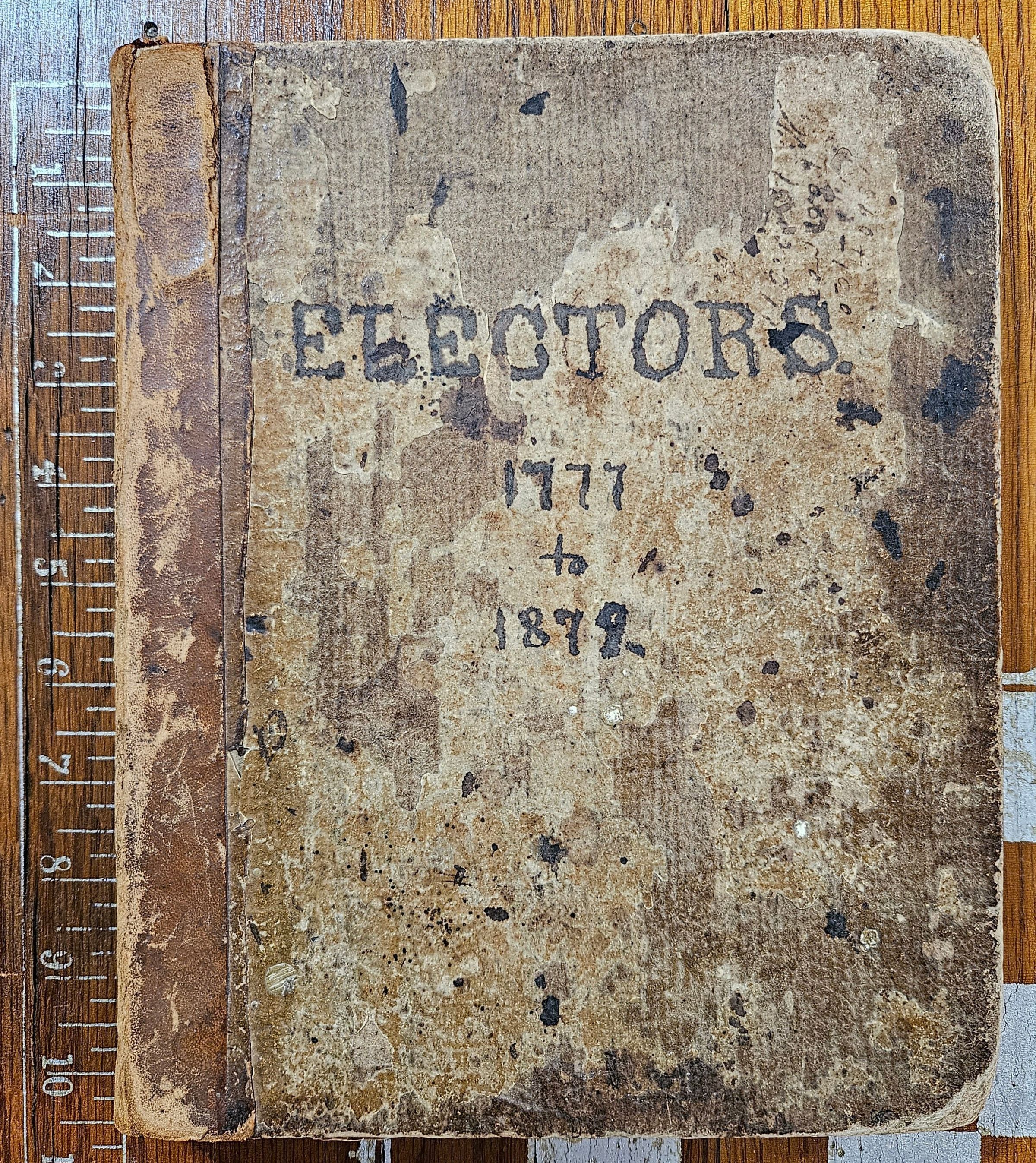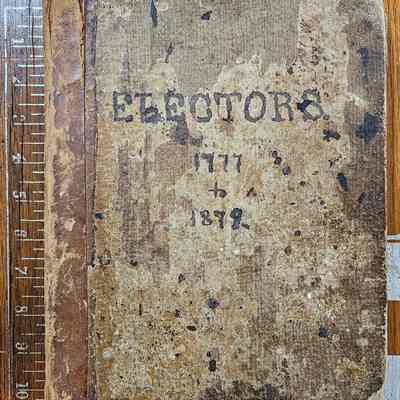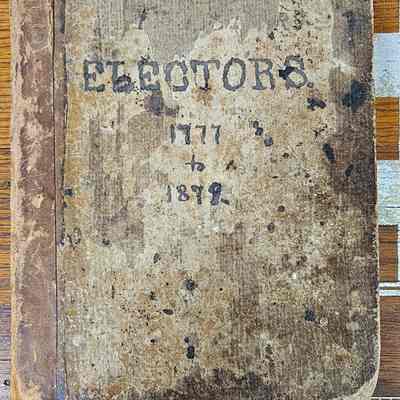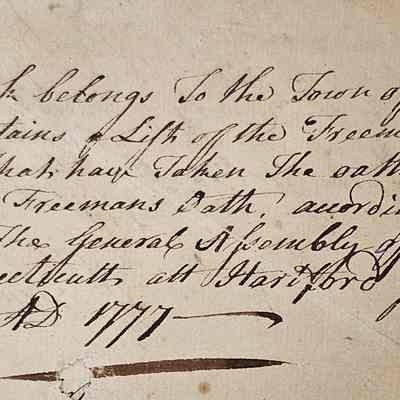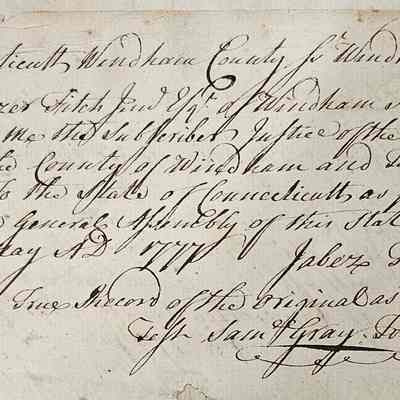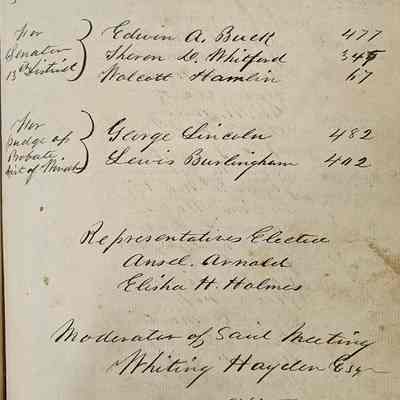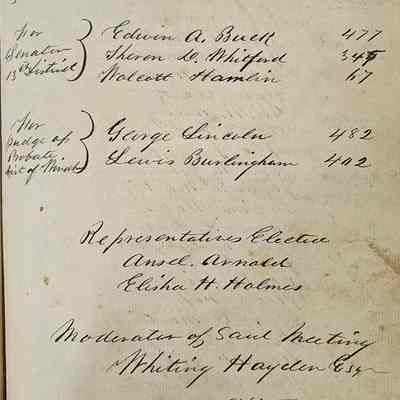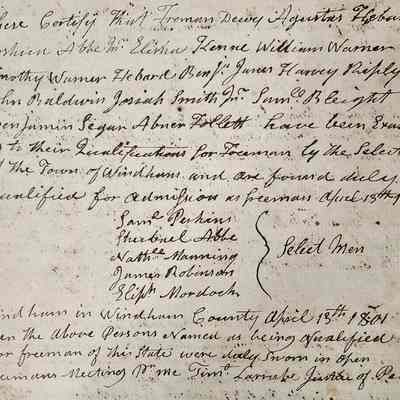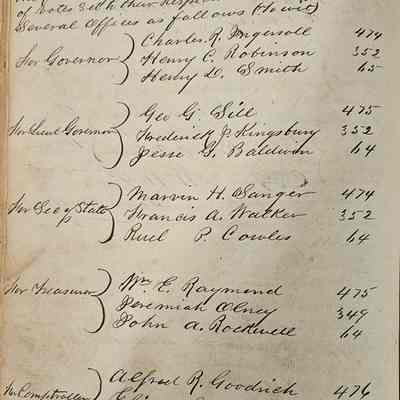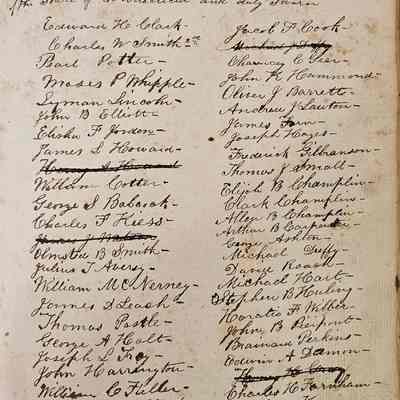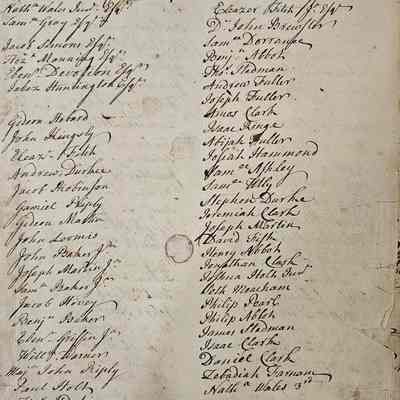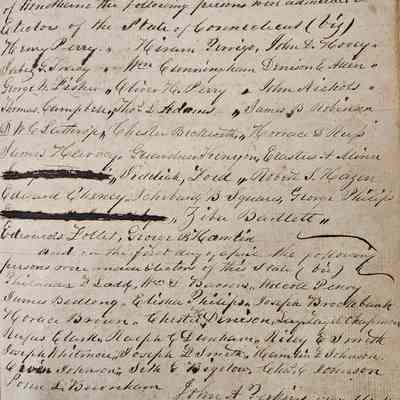Name/Title
Record Book, Town of Windham Electors, 1777-1878Entry/Object ID
2024.51.01Scope and Content
"Electors, 1777 to 1878." Records of electors of the Town of Windham, CT, 1777-1878. Includes lists of electors and minutes of electors' meetings. Handwritten on blank white pages in several different hands. Possibly kept by the Windham Town Clerk. Brown cardboard covers with leather spine.Context
The electors of a town were those individuals who were entitled and registered to vote. Voting rights included the right to participate in town meetings (also known as electors' meetings) and run for office. Under the New England Town Meeting Government in effect at the time, electors' meetings played a central role in local government. It was at these meetings that town officials (selectmen, Town Clerk, etc.) were chosen, town budgets were ratified, and many town ordinances were passed. Town government should not be confused with borough government. In the 19th century, the Connecticut General Assembly granted residents of urban areas the right to set themselves off as "boroughs" (later "cities") with limited self government, mostly over such urban concerns and issues as fire protection, police protection, paving streets, etc. -- and which in time were extended to include sewer and water services -- and tax themselves for the costs. Boroughs were thus governments within governments, as town government continued to handle wider, town-wide concerns such as education. The borough of Willimantic was established in the 1830s for the urban area of Willimantic in the northwest part of Windham. This record is a Town of Windham -- not a borough of Willimantic -- document, although all of the Windham electors who lived in Willimantic could also vote for borough officers, such as aldermen, as well as for Town officials.
The definition of who could or could not be an elector changed over time. From 1638 until it was replaced by Connecticut's first Constitution in 1818, the Fundamental Orders restricted voting rights to property-owning males 21 or older. "Admitted inhabitants" were property-owning men who had been formally accepted by the town as inhabitants and therefore permitted to vote in town elections. Property qualifications in Connecticut and other British colonies were less stringent than in Britain itself, so the electorate was (in 17th- and 18th-century terms) relatively broad. "Freemen" also had to be members of the Puritan (Congregational) Church, and only they could hold most elective offices. While some changes in these rules were made over the years, major changes were made in 1818, when Connecticut became the last of the original Thirteen States to adopt a formal Constitution. The new Constitution removed religious qualifications for voting, but also restricted voting rights to white men only. (In fact, there is no evidence that nonwhite men had ever voted in Connecticut previously.) Property qualifications were retained, but as before, were set fairly low. Connecticut did removed property qualifications in the 1840s, as part of a broader, nationwide movement for universal white manhood suffrage. Shortly after, though, in 1855 Connecticut added the requirement that electors must pass a literacy test. In 1897, the law was amended to specify that the language of literacy must be English. The 1855 law also required citizenship and at least a year's residency, all designed to prevent Irish immigrant men from voting. Connecticut was the first state to enact literacy requirements. Several attempts were made over the years to extend voting rights to nonwhite men, and some were even passed by the legislature, but all failed to win a majority in statewide referenda. (The Connecticut Constitution requires that amendments to the State Constitution be passed both by a vote of the legislature and a statewide referendum.) Finally, the 15th Amendment to the U.S. Constitution (passed 1870) overrode the Connecticut Constitution by outlawing racial discrimination in voting, a fact that was recognized in 1876 by an amendment to the State Constitution to eliminate the word "white" from the definition of electors. Thus, for all but the last two years of the period covered by this record book, electors in Connecticut were restricted to white males 21 or older, and for most of that period also to property owners. And for several years, literacy requirements were also in effect. In Connecticut, women did not get the right to vote until 1920, with the passage of the 19th Amendment to the U.S. Constitution and subsequent enabling legislation by the state legislature. Literacy requirements remained in effect until 1970, when they were declared unconstitutional by the U.S. Supreme Court.Collection
General CollectionLexicon
Nomenclature 4.0
Nomenclature Primary Object Term
Book, RecordNomenclature Sub-Class
Administrative RecordsNomenclature Class
Documentary ObjectsNomenclature Category
Category 08: Communication ObjectsArchive Details
Date(s) of Creation
1777 - 1878Archive Size/Extent
1 volumePrimary Language
EnglishArchive Items Details
Title
Electors, 1777 to 1878Description
Plain white paper with brown cardboard covers and a brown leather spineCreator
Windham Town ClerkDate(s) of Creation
1777 - 1878Location
Location
Vault
Vault* Untyped Location
Main Museum BuildingCategory
StorageDate
November 17, 2024Condition
Overall Condition
FairDate Examined
Nov 17, 2024Examined By
Eves, J.Materials
Paper, cardboard, leatherProvenance
Provenance Detail
Donor purchased object online from a collector for $250.Created By
historian@millmuseum.orgCreate Date
November 17, 2024Updated By
historian@millmuseum.orgUpdate Date
November 17, 2024